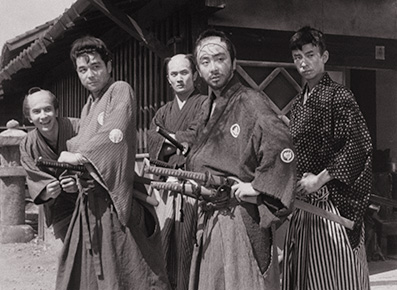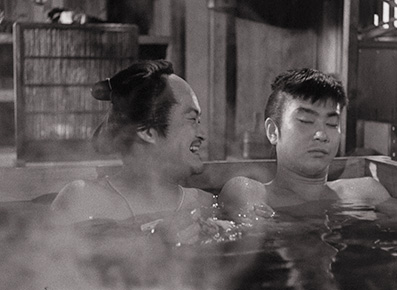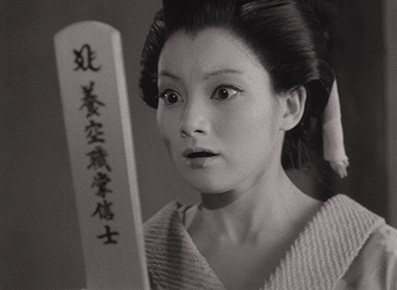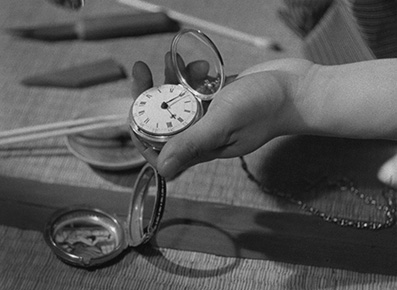|
As devotees of world cinema, cineastes if you prefer, we like to think that after a good few years of eager and intense film watching we've at the very least ticked off most of the major titles, those revered films that helped to shape cinema history or that occupy the top slots on listings from a particular genre, decade or country. One such regal list was compiled in 2009 by renowned Japanese film magazine Kinema Junpo of the top 100 Japanese films of the 20th Century. There are some surprising omissions, but the high end is occupied by what should be familiar titles: Ozu Yasujiro's Tokyo Story [Tôkyô monogatari], Kurosawa Akira's Seven Samurai [Shichinin no samurai], Naruse Mikio's Floating Weeds [Ukikusa] and Kawashima Yûzô's A Sun-Tribe Myth From the Bakumatsu Era [Bamumatsu Taiyô-den]. What's that? You've not seen that last one? It's hardly surprising. One of the most highly regarded of all Japanese films appears not to have been seen widely outside of Japan. As I type this I have the film's IMDb page up in front of me and there are no user reviews, no Metacritic reviews and only two external reviews, one of which is of this very Blu-ray*. It's Wikipedia entry is positively anaemic.

Following a brief but pacey prologue and a quick temporal jump to modern times for the title sequence, the film hops back to final days of the Tokugawa Shogunate to focus on life in and around a busy Tokyo brothel, where a number of concurrently running stories unfold. There's brashly self-confident Saheiji, who is treating his friends to a night of wine, women and music; there's a group of samurai revolutionaries who are plotting to set fire to the foreigners' quarter; there's religiously devout brothel owners Otatsu and Denbei and their dismay at the behaviour of their wayward son Tokusaburo; there's rival prostitutes Koharu and Osome and their determined efforts to become number one girl; and there's carpenter Chobei, whom Otatsu and Denbei are pressurising to settle his debt to them by selling his daughter into prostitution. Other characters come and go, from the cold-strapped policemen who arrives to inspect the rooms, to the foreign-faced brothel worker who repeatedly insists he was locally born and bred. Keeping tabs on who is who really does require all your concentration, particularly given the unwaveringly brisk pace in which the story strands unfold and increasingly interconnect.
We're well into the film's final stages before tubercular fun-seeker Saheiji emerges as the nearest thing the film has to a lead character. Played by then-popular comedian Frankie Sakai, his appearance at the end of the pre-title sequence resonates throughout the scenes that follow, as the dropped watch he retrieves is returned to its owner, twice repaired, offered as part-payment to settle a bill, and eventually given back to him for services rendered. Following his cheerful admission that he has no money, he is given the chance to work off his debt at the brothel and swiftly becomes the thread with which the story strands are bound, darting in and out of scenes to offer his own particular brand of assistance to anyone willing to pay him for his service.

Given the descriptive nickname Mr. Grifter by the brothel staff, Saheiji is able to turn his hand to just about anything, serving and greeting customers, administering therapeutic massages, dealing with troublesome drunks, settling tricky quarrels, and even procuring a map of the foreign quarter to aid the revolutionaries in their plans to set it ablaze. As has become the way with such loveable rogues, he eventually puts his pursuit of monetary gain aside to aid someone for purely altruistic reasons. By then he has proved his worth to Otatsu and Denbei and has become the focus of amorous attention from two of the ladies, but is still given no more screen time than those he interacts with.
Characters are introduced and defined on the move and most effectively so, an economic blend of the dramatic and comic allowing each of them register in a matter of seconds, essential to making a such a multi-stranded narrative work as well as it does. And Bakumatsu taiyô-den really is a delight, an intoxicating blend of drama, character comedy and social commentary that has the drive and momentum of a tidal wave that you can't help but be pulled along by. Director Kawashima hops between the stories with striking confidence and a deftness that almost qualifies as sleight-of-hand, with subplots and even conversations carried from scene to scene, often with different characters, lending fluidity to the narrative and unifying the various story threads.

And what fun these threads are. There's not a storyline here that doesn't bristle with memorable and often comic elements: the games that popular prostitutes Koharu and Osome play with customers in their pursuit of the top slot; acned book seller Kinzo's sniggering revelation that he has a book that shows foreigners' private parts; the alarmed female scream that escapes a toilet cubicle when a desperate-to-pee samurai whips open the door; the cross-cutting between Otatsu and Denbei's prayers and the bagpipe-accompanied marching of foreign troops outside; Kinzo's horror at the prospect of using razors to commit "love suicide" with Osome because "cuts with thin blades don't heal easily"; the monks who always seem to collide with other customers; samurai Takasugi's irritation at having a song he has written (whose lyrics alone – "I'd kill all the crows in the whole wide world so I can sleep in with my man" – had me giggling) sung back to him by Saheiji after making its way around the brothel; the revolutionary who swallows his explosives to hide them from the authorities, prompting his unsympathetic comrades to fall about laughing... It's a small sampling from an extensive list that I found myself adding to on the essential second viewing.
Bakumatsu taiyô-den is a genuine revelation, as entertaining, energetic and skilfully made a film as I've seen all year, and by a considerable margin. The lively ensemble cast are an absolute joy, with the perennially cheerful Frankie Sakai coming close to stealing every scene he appears in and only prevented from doing so by the cheerful vitality of his fellow performers; even the bit parts have been cast with care and given amusing bits of business to ensure that they register.
All of which begs the obvious question: how on earth has such a technically accomplished, critically lauded and richly enjoyable film managed to remain almost unseen outside of its home country for a seemingly impossible fifty-six years?
The result of a restoration carried out by Nikkatsu in Japan, this is a generally strong if not eye-popping transfer, with an often impressive level of detail (some shots are softer than others, suggesting more than one print was sourced for the restoration) and a pleasing tonal range that appears free of black crush or obvious burn-outs. There's not a hint of frame jitter anywhere (remember the days when we accepted that as the norm on older movies?) and the print is astonishingly clean. Film grain is visible but never intrusive. On the whole, a first-rate job for a film of this vintage.

The linear PCM 2.0 mono soundtrack has the expected range restrictions but is otherwise in good shape, with all of the dialogue (and the bagpipes!) clear and only a faint trace of background hiss, though the action rarely pauses long enough for you to notice.
One of those rare Masters of Cinema dual format releases with nothing at all in the way of on-disc extra features, but we do have the expected and always welcome Booklet, which includes an essay on the film by New York critic and scholar of Japanese cinema, Frederick Veith, recollections of working with director Kawashima by the film's celebrated co-writer Imamura Shôhei (who is a little critical of Bakumatsu taiyô-den, which he claims "should have been much more grandiose and interesting"), a useful note on the correct title translation (it was previous known as The Sun Legend in the Last Days of the Shogunate or The Sun Legend of the End of the Tokugawa Era), credits for the film, a couple of quality stills, and a reproduction of poster produced by Nikkatsu to mark the restoration.
Not much in the way of extra features, but when the film is this good I couldn't care less. Bakumatsu Taiyô-den is a treat from start to finish and looks pretty damned fine on this oh-so-welcome Masters of Cinema Blu-ray, which is already made its way onto my list of top releases for 2013. Devotees of world and particularly Japanese cinema owe it to themselves to get their hands on this disc. Highly recommended.
* This has since improved a little thanks to the release of this disc.
The Japanese convention of family name first has been used throughout this review.
|